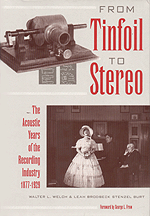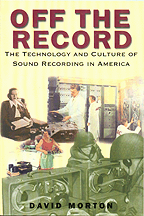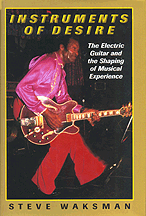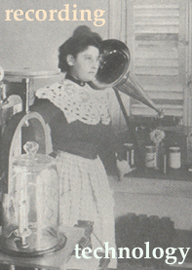 "From Tinfoil To Stereo -- The Acoustic Years Of The Recording Industry: 1877-1929"
"From Tinfoil To Stereo -- The Acoustic Years Of The Recording Industry: 1877-1929"
by Walter L. Welch and Lean Brodbeck Stenzel Burt
(University Press of Florida, 1994)

Revised of 1976 edition, first written in 1959 by Welch and Oliver Read. This is an amazing and absorbing history of sound technology, for many years the main source for people interested in the hazy technological past. It might be dry for some casual readers, but on the whole it's a pretty good read, well researched and comprehensive in its scope. If you ever wondered how all those nutty little soundmaking doo-hickeys came to be created -- and manufactured, and part of our everyday lives -- then this is the book for you.
 "Off The Record: The Technology And Culture Of Sound Recording In America"
"Off The Record: The Technology And Culture Of Sound Recording In America"
by David Morton
(Rutgers University Press, 2000)

A compelling sociological view of how sound recording has influenced the modern world. While music recording is an obvious starting point, this book also looks incisively at the dictaphone, the phone machine and the home tape recorder, and asks what impact they've had on the way we percieve or control the world around us, and how they've changed our notions of the transience of sensation and everyday experience. Sure, it sounds all eggheady, but it's not all written in ivory-towerese. Morton also looks at the populist aspects of recording technology, and how the availability of records and radio helped break down the conventional highbrow/lowbrow distinctions in civic culture, as well as how they redefined the role of musicians, composers and cultural gatekeepers in the broadcasting industry. For technology buffs, there are also some cool archival photos of recording lathes, and various commercial advertisements as well. Pretty neat stuff.
 "Instruments Of Desire: The Electric Guitar And The Shaping Of Musical Experience"
"Instruments Of Desire: The Electric Guitar And The Shaping Of Musical Experience"
By Steve Waksman
(Harvard University Press, 1999)

Although Jerry Lee Lewis or Stomp Gordon might have had something to say to the contrary, the development of rock and roll sure would've been hard to imagine without the invention of the trusty electric guitar. This book tracks the technological and sociological progress of the ultimate super-toy -- and how once Les Paul and others had solved the major technical bugs involved in guitar amplification, suddenly the world had a cheap, loud way for everybody to plug in. The Fender electric was one of the first mass-marketed axes, an innovative instrument which found its way into the hands of tens of thousands of would-be rock stars during the '60s pop boom, and a tremendously democratizing force in global culture. Steve Waksman looks at the history of the instrument through various pivotal or iconographic artists and tinkerers, folks such as Les Paul, Chet Atkins, Charlie Christian and Jimi Hendrix. His writing strikes a nice balance between the academic and the plain-spoken; maybe a little too egghead-y and high-falutin' in parts, but generally pretty engaging.


 Other Book Reviews
Other Book Reviews
Indiepop Indiedex
Slipcue Main Index
 "From Tinfoil To Stereo -- The Acoustic Years Of The Recording Industry: 1877-1929"
"From Tinfoil To Stereo -- The Acoustic Years Of The Recording Industry: 1877-1929"





